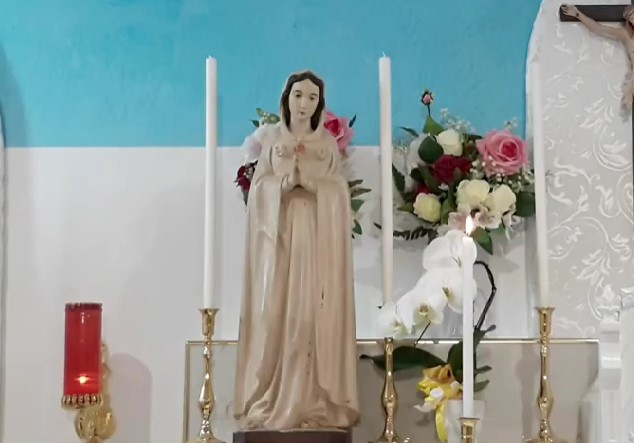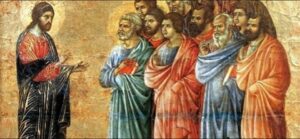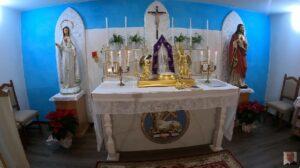
Do not be afraid, little flock, for it has pleased your Father to give you the kingdom.
ORARI S.MESSA DI MERCOLEDI 22 GIUGNO ORE 8.00: S. Paulini Episcopi et Confessoris ~ III. classis
Tempora: Feria IV infra Hebdomadam II post Octavam Pentecostes
S.MESSA ONLINE DI DON ENRICO RONCAGLIA, su youtube channel:
https://www.youtube.com/channel/UCYYDj4O4e11cE7XNtngkoJA
e qui:
LITURGIA IN LATINO\ENGLISH:
https://divinumofficium.com/cgi-bin/missa/missa.pl
COMMUNIO PREGHIERE\PRAYERS:
https://www.proselitismodellascienza.it/2021/10/25/communio-e-comunione-spirituale/
EVANGELIUM E OMELIA\HOMILY:
Evangelium
Luc 12:32-34
In illo témpore: Dixit Iesus discípulis suis: Nolíte timére, pusíllus grex, quia complácuit Patri vestro dare vobis regnum. Véndite quæ possidétis, et date eleemósynam. Fácite vobis sácculos, qui non veteráscunt, thesáurum non deficiéntem in cœlis: quo fur non apprópiat, neque tínea corrúmpit. Ubi enim thesáuros vester est, ibi et cor vestrum erit.
Gospel
Luke 12:32-34
At that time, Jesus said to His disciples, Do not be afraid, little flock, for it has pleased your Father to give you the kingdom. Sell what you have and give alms. Make for yourselves purses that do not grow old, a treasure unfailing in heaven, where neither thief draws near nor moth destroys. For where your treasure is, there also will your heart be.
DALL’OMELIA DI (FROM THE HOMILY BY) DON ENRICO RONCAGLIA – ORARI S.MESSA DI MERCOLEDI 22 GIUGNO ORE 8.00

DALL’OMELIA DI DON ENRICO RONCAGLIA (*,1)
2 Cor 8:9-15
Fratelli, voi conoscete la grazia del Signor nostro Gesù Cristo che, essendo ricco, si fece povero per voi, affinché voi mediante la sua povertà diventaste ricchi. E in questo vi do un consiglio, poiché ciò è utile a voi, che fin dall’anno scorso foste i primi non solo a fare la colletta, ma anche a volerla; ed ora conducetela a termine, affinché alla pronta volontà corrisponda il compire l’opera, secondo i vostri mezzi.
Luca 12:32-34
In quel tempo Gesù disse ai suoi discepoli: «Non temere, piccolo gregge, perché è piaciuto al Padre vostro di dare a voi il regno. Vendete i vostri beni e dateli in elemosina.
San Paolino di Nola (Bordeaux, 355 – Nola, 22 giugno 431), è stato un vescovo italiano, originario della Aquitania, venerato dalla Chiesa cattolica come santo. Fu vescovo di Nola nel V secolo. È considerato dalla Chiesa il patrono dei campanari. A lui è attribuito infatti l’uso delle campane nelle chiese.
A Barcellona conobbe e sposo Therasia, cristiana e battezzata. Therasia lo guidò verso la conversione. Poi si dedico con la moglie alla vita contemplativa. A Nola divenne sacerdote e vescovo. Era il tempo delle invasioni barbariche. Paolino si dedico’ all’assistenza dei bisognosi e sofferenti.
Ma a 55 anni, passò dall’essere sacerdote a essere vescovo e poi schiavo nel giro di un anno. Non desiderava altro che la liberazione sua e di tutti i nolani con lui. Così avvenne. Ancor oggi sopravvive la tradizione dell’accoglienza: la prima domenica dopo il 22 giugno, a Nola si tiene la Festa dei Gigli.
Sia lodato Gesu’ Cristo! Sempre sia lodato!
____________________
(*) Questo commento e’ scritto in tempo reale durante l’omelia. Mi scuso per l’eventuale misinterpretazione delle parole di Don Enrico.
(1) La Cappella dei Sacri Cuori e’ d’ora in avanti sotto la protezione della Madonna Pellegrina di Montichiari (Brescia, 1946).
FROM THE HOMILY BY DON ENRICO RONCAGLIA (**,1)
2 Cor 8: 9-15 Brothers, you know the grace of our Lord Jesus Christ who, being rich, made himself poor for you, so that through his poverty you became rich. And in this I give you some advice, since this is useful to you, who since last year were the first not only to take the collection, but also to want it; and now carry it out, so that the ready will corresponds to the completion of the work, according to your means.
Luke 12: 32-34 At that time Jesus said to his disciples: «Do not be afraid, little flock, because it has pleased your Father to give you the kingdom. Sell your goods and give them in alms.
San Paolino di Nola (Bordeaux, 355 – Nola, 22 June 431), was an Italian bishop, originally from Aquitaine, venerated by the Catholic Church as a saint. He was bishop of Nola in the fifth century. He is considered by the Church to be the patron saint of bell ringers. In fact, the use of bells in churches is attributed to him. In Barcelona he met and married Therasia, a Christian and baptized.
Therasia guided him towards conversion. Then he dedicated himself to the contemplative life with his wife. In Nola he became a priest and bishop. It was the time of the barbarian invasions. Pauline dedicated himself to assisting the needy and suffering.
But at 55 years old, he went from being a priest to being a bishop and then a slave within a year.
He wanted nothing more than his release and that of all the Nolans with him. So it happened. The tradition of hospitality (his return home) still survives today: the first Sunday after June 22, the Festa dei Ligli is held in Nola.
Praised be Jesus Christ. Always be praised!
___________________
(**) This comment is written in real time during the homily. I apologize for any misinterpretation of Don Enrico’s words
(1) The celebration Chapel of Sacred Hearts from now on is set under the protection of the Pilgrim Madonna of Montichiari (Brescia, Italy, 1946).

